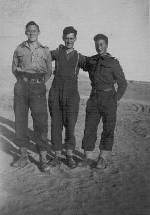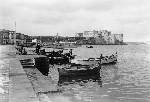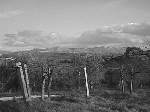Part 2 - Western Desert In the desert we passed HellfirePass, a huge zigzagging road up to a mountain pass, built by the Italians and now littered with the burnt out wreckage of British tanks and trucks. We bypassed Tobruk on the coast road and then set up camp in the desert 10 miles south of the highway. I spent two or three months in the  desert. Then one day in June the Germans broke through, the next camp along from ours was overrun and we were ordered to evacuate back onto the coastal highway, every man for himself! Unfortunately my vehicle, a 3 man wireless truck wouldn’t start. The driver cranked and cranked the engine and eventually got it going but by then we were all alone. We headed north and joined the coast road but spotted some Germans so quickly got back off it, into a wadi and lay low until everything was quiet again. We set off once more along the road, picking up a stranded Indian soldier on the way. desert. Then one day in June the Germans broke through, the next camp along from ours was overrun and we were ordered to evacuate back onto the coastal highway, every man for himself! Unfortunately my vehicle, a 3 man wireless truck wouldn’t start. The driver cranked and cranked the engine and eventually got it going but by then we were all alone. We headed north and joined the coast road but spotted some Germans so quickly got back off it, into a wadi and lay low until everything was quiet again. We set off once more along the road, picking up a stranded Indian soldier on the way. Suddenly up ahead some trucks crossed the road and stopped. ‘They’re Indian Army trucks’ said Wilf. So we drove on towards them. Back at those trucks, soldiers were getting out and setting up machine guns. Then all at once, we were under fire. Germans in captured Indian lorries! We stopped and dived under our truck for cover. Suddenly the Indian stood up and waved his hands in the air. They didn’t shoot him so we did the same. They lined us up. ‘Curtains Charlie’ I thought. The German officer asked for our Regiment. We gave him name, rank and serial number as we’d been taught. He read the regiment name off our shoulder patches. We were put on a truck with other British and Indian prisoners. There wasn’t much water. We received a small bowl each day which we Tommies promptly drank but which the Indians washed themselves in first then drank. At one point we stopped near a lake and all rushed to it for a drink but the lake turned out to be a salt marsh. Some drank it but were violently sick shortly afterwards. They took us to Benghazi, to a prison camp and handed us over to the Italian Army. Libya was an Italian colony at that time. The Italians transferred us into the hold of a prison ship in the harbour where we were promptly bombed by the RAF, who fortunately missed. Eventually the ship sailed to Tripoli where we disembarked and were put in an Italian run prisoner of war camp. We received the same rations as the Italian Army whilst we were there and that included a daily wine ration! After a short stay we were once again put into a prison ship, this one bound for Brindisi in southern Italy. There were two ships in the dock loading with prisoners. I couldn’t see the name of the ship I was boarding but the other was the SS Scillin. This was a dangerous journey, passing close to Malta without benefit of convoys or escorting warships. The skies were controlled by the RAF. The Italian sailors walked around barefoot. They were so concerned about the chances of the ship sinking and not being able to swim in boots that they did without. It took a couple of days to sail to Italy and although we were frequently attacked we suffered no significant damage. Many years later I learned that the SS Scillin was sunk that voyage by a British submarine with the loss of 787 allied prisoners of war including many from my regiment the 97th Kent Yeomanry (it was the regiment’s biggest single loss of the entire war). We were marched through the streets of Brindisi.  Huge crowds turned out. Half of them jeered and spat at us. The other half gave us bread and wine. We’d been locked below decks during the journey and everybody’s skin and clothing was dyed bright red by whatever the previous cargo had been. Huge crowds turned out. Half of them jeered and spat at us. The other half gave us bread and wine. We’d been locked below decks during the journey and everybody’s skin and clothing was dyed bright red by whatever the previous cargo had been. We were moved to a camp at Capua near Naples where I could see Mount Vesuvius smoking away. Then I was moved on to a camp at Fara Sabina, about 10 miles from Rome. Fara Sabina was mostly filled with South Africans and Brits. We received 2 slices of bread and one ladle of soup a day. (We always tried to get to the back of the queue because the soup was thicker at the bottom of the pot.) We received Red Cross parcels, the size of shoe boxes at regular intervals, full of ‘luxuries’ such as tea and soap. We often traded these luxuries with the local Italians. Everything had a going rate. Throwing a bundle of soap or pack of tea over the barb wire fences would result in a couple of loaves coming the other way. Some canny prisoners would use the tea first, dry out the leaves in the sun, repackage it then trade it with the Italians. The Italians sold these luxuries on the black market in Rome. There were several tunnels being built for escapees. My two pals were miners and very much involved in this work. We were all very lousy, from the lice and other bugs and spent a lot of time cleaning ourselves up. The camp had lots of Northern Irish soldiers. Being Catholic I found their prejudices to be rather extreme. Because I was a tailor by trade I was able to earn extra rations for sewing red patches onto the jackets and shorts of prisoner uniforms. In September 1943 allied forces landed on the Italian mainland, the government surrendered and the guards simply abandoned us. Our Italian interpreter, who didn’t run away, advised us to disperse into the hills before the Germans turned up. We often traded these luxuries with the local Italians. Everything had a going rate. Throwing a bundle of soap or pack of tea over the barb wire fences would result in a couple of loaves coming the other way. Some canny prisoners would use the tea first, dry out the leaves in the sun, repackage it then trade it with the Italians. The Italians sold these luxuries on the black market in Rome. There were several tunnels being built for escapees. My two pals were miners and very much involved in this work. We were all very lousy, from the lice and other bugs and spent a lot of time cleaning ourselves up. The camp had lots of Northern Irish soldiers. Being Catholic I found their prejudices to be rather extreme. Because I was a tailor by trade I was able to earn extra rations for sewing red patches onto the jackets and shorts of prisoner uniforms. In September 1943 allied forces landed on the Italian mainland, the government surrendered and the guards simply abandoned us. Our Italian interpreter, who didn’t run away, advised us to disperse into the hills before the Germans turned up. |